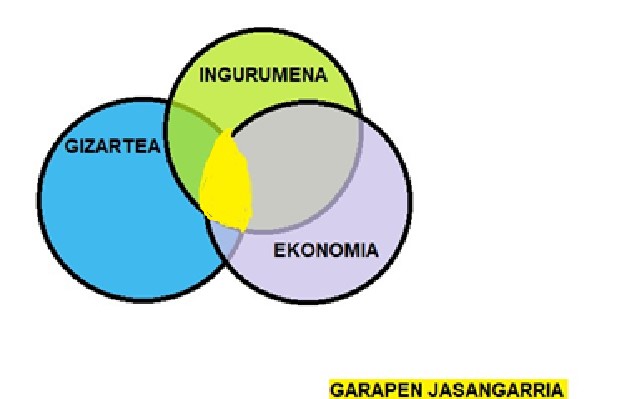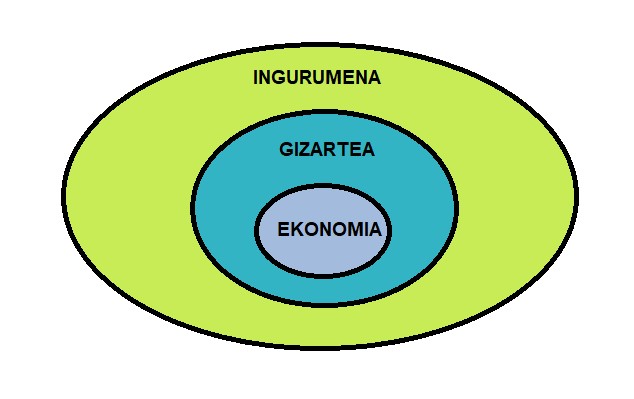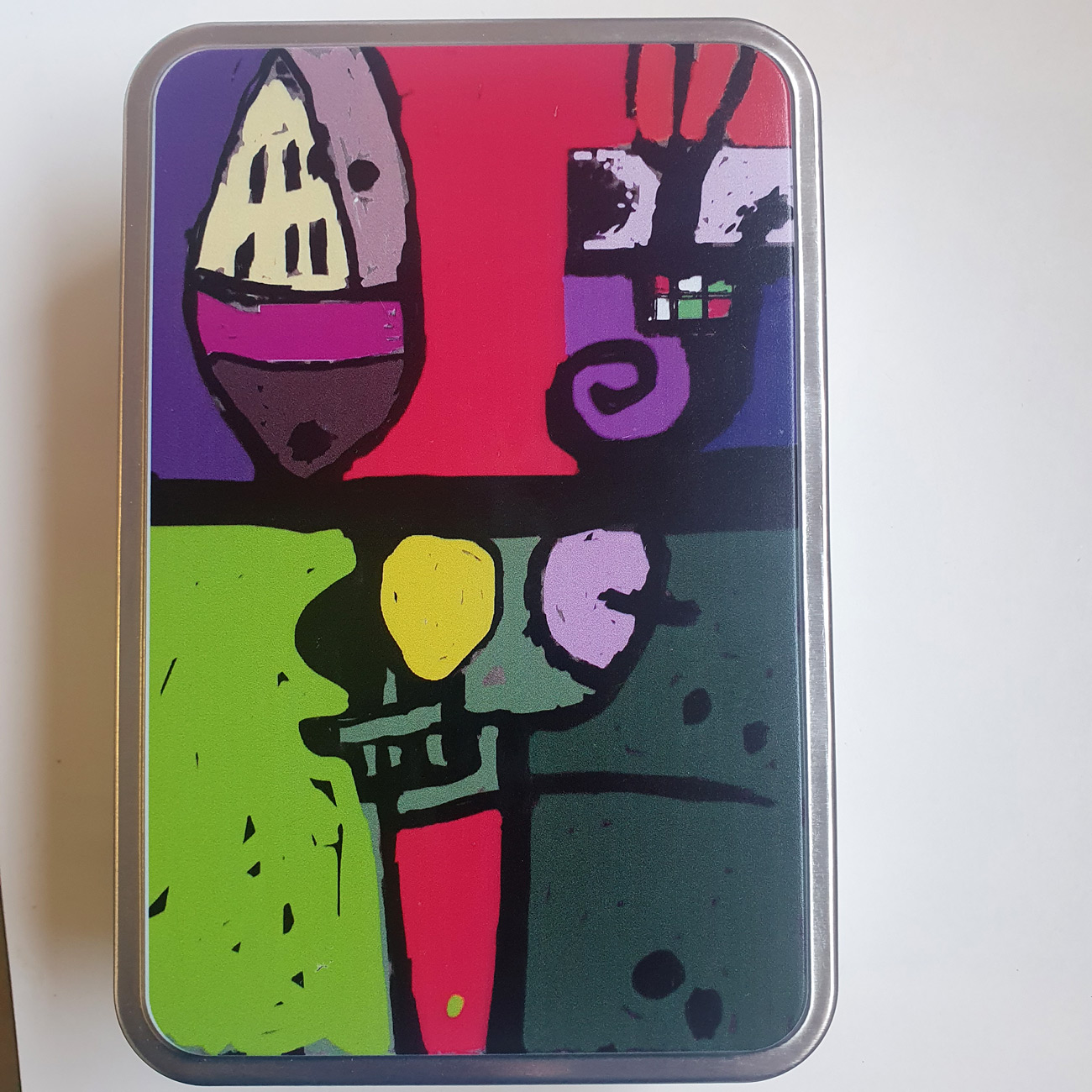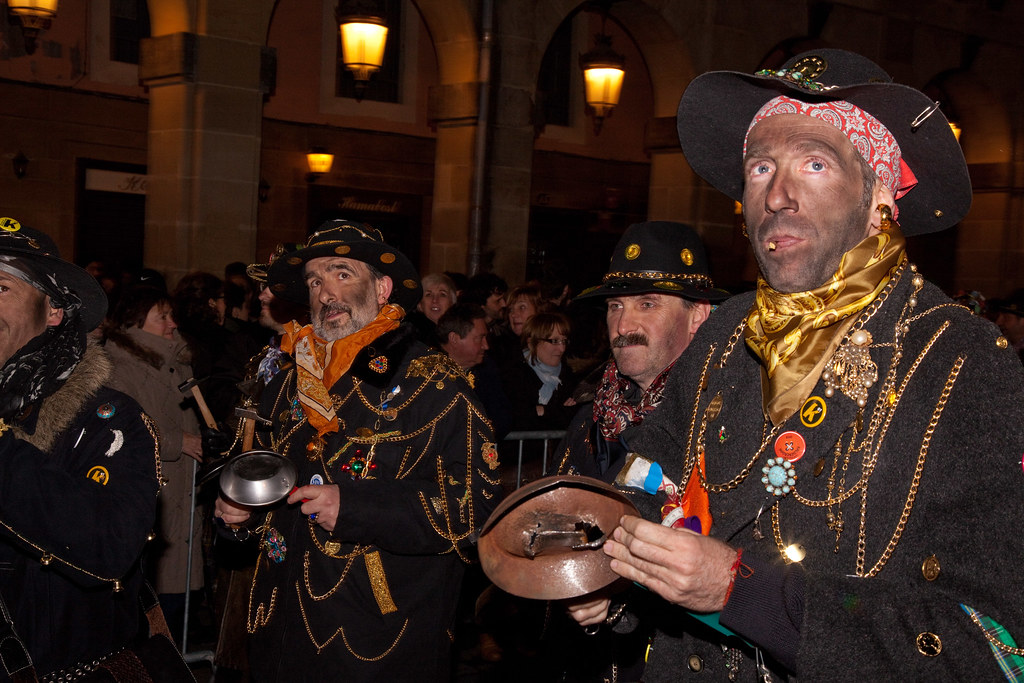"Energy transition, how?" Round-table members
On 19 March, in the Alondero room in Zestoa, we had an interesting round table on the energy transition organized by the community and renewable energy cooperative Argiola.
The round table was entitled “Energy transition, how?” and for this purpose the organizers invited biologist Aitziber Sarobe and the natural Zarauztarra and marine energy researcher Markel Peñalba. Zestoa journalist, Jon Artano, highlighted in his role as moderator, treating the issue seriously, showing his closeness to the participants and his good humour practices.
About an hour and a quarter, the two teachers of Mondragon Unibertsitatea were giving rich explanations, and at many times, even in a healthy debate, defending each of their views on this transition. Around the last half hour, more than half a dozen people who met had the opportunity to ask questions and get their opinions across. The session was juicy and rich, we were in a nice atmosphere and I think the expectations of about 50 people who met in the room were met.
I also wanted to comment on two or three things, but we decided to end the session before we died. For this reason, I decided to clearly write these two or three questions that I had intended to comment on, in order to send them as opinion articles to the media of the region (although I have been lengthened in time on the occasion of daily tasks and holidays of Easter).
These issues I would like to comment on are addressed to the two main guests and the other participants at the table, but why not, by the way, those who could not be there.
In the programme, the two guests showed their vision of the crisis of various environmental indicators, the main reasons for the energy transition, how to do it, what to do while doing it, its effects, the consequences of not doing so, etc. Both agreed that the transition should not only be energy, but also materials, waste, food production process and, in general, our consumption habits, in short, economic, cultural and social oriented towards the care of the environment and biodiversity.
But in some aspects and/or visions of the transition did not coincide, and each maintained his/her with respect and reason of weight. Most of these views I share with Aitziber, sometimes with Markel and others I have no very clear ideas, because the subject is very complex. I will now try to explain some of these views, always making it clear that I am not an expert in energy or in the environment. Although I am a high school economics and trade professor and have the postgraduate “Agenda 2021: sustainable development”, I want to make these statements as an entrepreneurial citizen, committed to caring for the environment and the welfare of society.
First of all, Jon Artano asked the two to respond to the title of the round table: “Energy transition, how?”, Aitziber said that, if I am not mistaken, we have to make the transition, but he does not agree with the urgent strategy that Europe has adopted because, besides being based on destructive macro-projects against nature, in countries with minerals needed to make the transition, it has provoked and has “killed.” Finally, he added that “green” energy from renewable energies comes from (to increase) fossil sources and not to replace it.
When Markel answered the question, he said that the transition must have three main characteristics or conditions:
1. The measures to be implemented must be comprehensive, as the problem is global and the response must also be global. It will be pointless to take action only in some countries.
2. It must be based on scientific criteria. So far, the most effective advances and measures have been based on science, which is also the greatest guarantee for the transition.
3. It must be democratic, that is, a consensual transition between the people or society.
But in my opinion, Markel, the energy transition will have to be the fourth feature: it must be based on a reasonable and fair model of sustainable development. And if we were to sort out the 4 features mentioned because of their importance, I would first put what I added on the list. Because the sustainable development of society (or survival if carried to the extreme) is intimately linked to the environment, we depend on it. It is also related to our desire to preserve the very health of the environment (policies), and in recent decades it is drawing our attention to the fact that its situation is deteriorating radically.
However, it seems that the main public and private institutions, close or distant, are not aware of this, as they are not taking sufficient account of the state of the environment in energy transition decisions. And that is, in my view, the origin of most social movements against many projects and measures in this area.
But when talking about sustainable development, I would like to make it clear that I am not so far talking about a concept of sustainable development that companies use in any way (sometimes companies only use to whitewash or greenwashing). In this extended idea, in the circulars between the environment, society and the economy, “sustainable development” is called the area in which the three areas converge, which have the same weight and/or importance.

The approach to sustainable development to which I refer also has those three circles, but the most rounded is the environment, within which society is the second largest and within it the smallest economy.

From this perspective, these three aspects have different degrees of importance in the concept of sustainable development and, of course, the environment is the one with the highest priority or relevance, followed by society and, finally, the economy.
This interesting vision of sustainable development was explained by the professor of economics at the UPV/EHU and member of the Hegoa and Ekopol associations, Iker Etxano, in the talk that the Elkar-Ekin group organized in April 2019 under the title “If our socioeconomic model is sustainable” in Azpeitia. This new vision is not going to be yours, but at least I must know it and open her eyes to its meaning.
Therefore, the energy transition (and from materials, food, socio-cultural ...) should take as a reference this vision of sustainable development, in my opinion, Markel. If we do not, the transition will be corrupt, we will fail as a society. Because, being the main reason for the transition the conservation of the environment, we will continue to attack it again and again, as we are doing so far. The clearest examples of this false sustainable development are the TAV and the Zubieta incinerator, which are by no means environmentally sustainable, socially sustainable, and economically the TAV will not be viable.
In the case of the incinerator, Mr Asensio and the PNV have also given the name "New Environmental Space of Gipuzkoa". It seems like a joke: the wolf presents us as a sheep disguised as sheepskin, just behind the neck... The citizens have described these authorities as naïve (the zestoarras would give it for babado), it is an Oscar of hypocrisy!
Both Markel and Aitziber said the problem is serious. But Markel insisted that we have to make decisions relatively quickly rather than being in a permanent debate. Yes, I think he is quite right, because we have to make decisions without falling asleep and without tangling in the xextra. But I think it's also true, because in the last few decades we have almost done nothing, that now, instead of making urgent and wrong decisions, it's better that we take them rationally, coherently and consensually, even though we need a little more time. I mean, while we're going to need more time for the energy transition, we're going to do it right.
In this sense, Markel pointed out that on this issue all the alternatives have an environmental cost, that there are no alternatives that do not have an ecological footprint. Okay, Markel, but we'll have to prioritize the options that minimize the ecological footprint, right? And there is one of the keys to this question and to this economic and socio-cultural transformation: to what extent are we prepared to destroy the environment in exchange for excessive consumption and increased hunger for money (ditxoso GDP)? And in exchange for maintaining our well-being? It is difficult to answer these questions (especially the second), but we must give them an answer to this social transformation. A good example for this path can be the entrepreneurial movement of the Ecosocial Jump, presented a few days ago among different social agents. To see if this initiative serves to open the eyes of people and institutions and we use it to start a proper path as a society. I hope that we and our descendants will be able to strike a balance between decent, just and environmentally friendly welfare.
There was also talk of door-to-door issues. In Marcos's opinion, the drawbacks of this waste collection system (the need to extract each material in specified days and hours of the week, odor, location and visual impact of the metallic hanging structures, etc.) Door-to-door was the main cause of failure. According to Aitziber, the main reason was El Diario Vasco's campaign against this collection system.
To what extent are we prepared to destroy the environment in exchange for increasing our excessive consumption and our hunger for money? And in exchange for maintaining our well-being?
Although both are right, in this case I think Markel is more right. Because, although El Diario Vasco and the PNV influenced the issue, spreading the debate and manipulating people, it is true that, in my opinion, the citizens were not accustomed to the characteristics of a collection system of this kind at that time and were not prepared to face the drawbacks that this system entails and to make an effort to overcome them.
I also find very interesting what a citizen who came to the round table said. While the current political system remains the same, we citizens have little ability to decide on such important issues as transition. Unfortunately, I think he is right. Because I believe that if we citizens have decision-making power every four years and that possibility is for political parties, then I believe that we have a low-quality democracy. See if we act courageously and when we spend every four years of the “partisanship” we choose the parties when necessary to pseudodemocracy in which we choose ideas and projects (some system closer to democracy...). And it would be good to vote when it is necessary, once a year, two, when there is some important issue… or, in the same vote, to vote on two or three subjects… And why not, use the new technologies if the conditions of transparency and security are fulfilled. Since this may seem to be a long-term issue, I am not going to expand on it any further, I will just throw away that envy.
Although it was not directly mentioned in the round table, I would also like to give my opinion on the Piaspe project that you want to build on Mount Sañu. I do not agree at all with the project and that is why I have tried from the outset to participate in the initiatives organised by Sañu Bizirik as far as possible. This contradiction is mainly due to the fact that this project follows the model of the industrialization of the mountains with gigantic windmills, and to the fact that, in view of its advantages, the damage to the environment and to the public is much greater (it is the main cause of the creation of this group and the merger of its members). In addition, one of the main conclusions of the exhaustive analysis of the energy resources generated by the Diputación General, together with various actors around 2020, was that the territory of Gipuzkoa is by no means adequate for the construction of this type of wind power plants. Among other things, because we have a very small territory, behind the mountain of a village, we immediately have another village. We do not have, like other territories, as many square kilometres of land with different environmental values. We live in a box of matches and we couldn't live between mountains full of gigantic monsters of this kind. Therefore, those of us who are against such projects are not infected by Nimby syndrome and I do not think we are selfish to think so.
I have to say that Piaspe has an interesting innovative vision that I believe is fundamental: it internalizes the idea of shared ownership of energy resources. This is, in my view, the only important positive contribution that the Piaspe project makes. And it's important to propose and push these kinds of formulas, but not in our mountains.
The Azpeitia City Hall, despite the passage of time, is choosing not to show a clear position and to keep it almost silent. It has not had the courage to say mother to the party’s ideas and to give its own opinion. Where, on this subject, is the transparency and the process of citizen participation that has so far proved so good and courageous in other matters? For the time being, in addition to that commercial presence in Soreasun at the beginning of the debate, almost nowhere. His position, until I know, has been frozen in the phrase “we are studying the subject”.
The most positive and hopeful expression I have heard from the City Hall in the last year and a half has been read two or three months ago in Uztarria. They say that the City Hall has to start a study of the resources that the people can have to generate energy (they are the ones that have been said before the last elections, but I hope that it will not remain merely political propaganda). These resources include hydro, solar panels, photovoltaic, geothermal, biomass and wind. I hope that the latter will be based on self-consumption rather than on devastating giant projects built on the mountains, on small-scale projects or, far from the mountains, on high towers built in degraded areas. Because, in my humble opinion, if we want to make a fair energy transition in a sustainable way, that strategy must be one of the fundamental pillars, and it should be the one clearly put forward by public institutions (and citizens, of course): from a reasonable reduction in consumption, we should analyse the energy needs that we have in the territory, and then exploit the energy generation resources that we have here and that are of all (of course, on a low scale). All this, not forgetting that investing in research and development (in science, in short) is also essential in this case, if we are to have at hand progress that will help us to tackle the problem in the future.
And if we do not generate enough energy, we will have to take into account other alternatives: larger scale projects that minimize the environmental impact (in coastal areas, low-value rural and uninhabited areas, low-environmental mountains, etc. ), more rational exploitation and consumption of fossil energies, etc.
In recent years, all political parties, including the PNV and EH Bildu, have in their discourse climate change, sustainable development, the circular economy, food sovereignty and other ideas or values for the environment and citizenship. But both sides have neglected all these ideas in the development of their political strategy and are showing enormous inconsistency (in the case of EH Bildu, more if possible, in relation to the line it has hitherto maintained in its trajectory).
Finally, with regard to Jon Artano and current and future journalists in general, I have to say briefly. In the current society of excessive information, I believe that they have a very important role to play in two respects. On the one hand, to deny truthful information and, on the other hand, to prioritize information aimed at the well-being of society over information for the benefit of private interests and, above all, of big business corporations. And, of course, disseminate all that information in society following the principles of journalism and the deontological code of the journalist.
The day was very thoughtful and I hope that more sessions of this kind will be organised around the energy transition and issues of general interest to citizens. Congratulations to participants and table organizers!
Jon Garagarza Arozena (Azpeitia)
Bidali zure iritzi artikuluak iritzia@argia.eus helbide elektronikora
ARGIAk ez du zertan bat etorri artikuluen edukiarekin. Idatzien gehienezko luzera 4.500 karakterekoa da (espazioak barne). Idazkera aldetik gutxieneko zuzentasun bat beharrezkoa da: batetik, ARGIAk ezin du hartu zuzenketa sakona egiteko lanik; bestetik, egitekotan edukia nahi gabe aldatzeko arriskua dago. ARGIAk azaleko zuzenketak edo moldaketak egingo dizkie artikuluei, behar izanez gero.
Otsailaren 3an hasi da gure umeak eta gaztetxoak eskoletan aurre-matrikulatzeko garaia, eta urtero bezala gogoratu nahi genizueke zergatik ez zaigun ideia ona iruditzen erlijioan matrikulatzea. Iaz artikula bukatzen genuen esanez “askori idazki hau ezaguna egingo zaizue,... [+]
Tranbia txiki Arratia Institutuko Guraso Elkartetik pantailen erabileraren inguruko hausnarketa bultzatu nahi dugu ikas komunitatean.
Azkenaldian kezka handia dago ume eta nerabeengan pantailek duten eragina dela eta. Ardura hori etxeko erabileratik eskola eta institutuetako... [+]
In 2021 we began to hear the first echoes of the Guggenheim Urdaibai project. The then General Manager Unai Rementeria told us that it would be done yes or yes. To reinforce his claims, he left 40 million euros “shielded” by the time the museums were built. There it is!... [+]
"(The purpose of the Oion Plenary) is clear, to legitimize by law the energy megaprojects with significant irregularities in the processing"
Last Wednesday we had a hard and unpleasant day, not only for Labraza, but also for all the towns where we are threatened by a wind,... [+]
Just as we experienced the flourishing of the Basque Country with the help of the artists, so that this time, taking advantage of their impulses, we continue to make our way together giving the necessary support to the Basque political prisoners, exiles and deportees
The... [+]
Epistemology, or theory of knowledge, is one of the main areas of philosophy, and throughout history there have been important debates about the limits and bases of our knowledge. Within this we find two powerful corridors that propose different ways of accessing knowledge: The... [+]
We learned this week that the Court of Getxo has closed the case of 4-year-old children from the Europa School. This leads us to ask: are the judicial, police, etc. authorities prepared to respond to the children’s requests? Are our children really protected when they are... [+]
I don't want my daughter disguising herself as a Gypsy in the caldereros. I don’t want Gypsy children at my daughter’s school to dress up as Gypsies in caldereros. Because being a gypsy is not a disguise. Because being a gypsy is not a party that takes place once a year, with... [+]
The year 2025 will lead to a general policy of establishing shorter working weeks, bringing low costs for new hires for companies and an effective direction of change in labour relations.
With the aim of complying with the Spanish government agreement, the reform to shorten the... [+]
To be honest, I don't know why I'm writing this. In today’s hostile environment, opinions of this kind are not well received. Perhaps LUZ will not publish this because it does not correspond to the opinions they have published so far (but if they have finally decided to publish... [+]
On January 15, the techno-business lobby called Cedarios presented its 6th report, Euskadi and the European Union, the shared destiny of prosperity and competitiveness. This neoliberal Think Tank, made up of eminent experts drawn from the world of finance, presented a magical... [+]
We Basques move our feet behind the witness of Korrika to proclaim that we want to survive as a Basque people in favor of our language, with the aim of the Basque Country we desire.
The tipi-tapa is the first step taken by a migrant person who leaves his homeland in Africa,... [+]
And for another year, the unions have organized prefabricated strikes for us. And we, individually, will decide whether or not to join the strike, without the need for any assembly at the school.
The strike model that I was taught is no longer in vogue, it seems. In my... [+]











